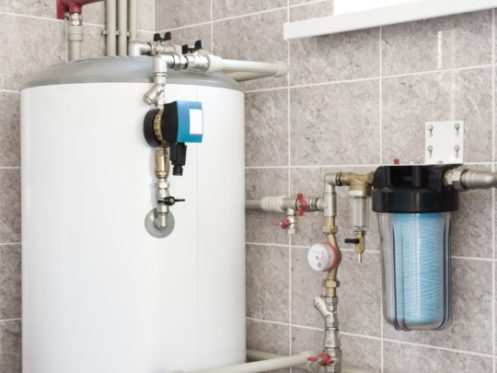Your water heater obviously plays a hugely important role in the home by ensuring you always have a steady supply of hot water for showering, washing dishes, etc. However, there are a wide variety of issues that can cause your water heater to start leaking, make loud noises or otherwise not work as it should. Traditional water heaters are especially prone to a variety of issues that generally aren’t a problem with tankless units. With this in mind, let’s look at some of the most common issues that can occur in gas and electric traditional water heaters and how they can be fixed.
1. Water Leaking from the Tank
Leaks are a fairly common problem with traditional water heaters, which is one of the main reasons why more and more people are switching to tankless units. Leaks can occur at any time, but the older the unit is, the more prone it will be to leaking. If you notice water on the floor around the unit, the first thing to check is whether the water is leaking from the top of the unit or the bottom.
If the unit is leaking from the top, it could be something simple like either the cold water inlet pipe or hot water outlet pipe aren’t fully tightened. The leak could also indicate that the T&P (temperature and pressure) valve is broken and needs to be replaced. The third possibility is that the ball valve is leaking and needs to be tightened. The first issue is something that you can easily fix on your own, but you will need to have a professional plumber fix any problems with the T&P valve or ball valve.
Water leaking from the bottom or underside of the unit is usually nothing to worry too much about as long as the tank itself isn’t leaking. If the tank is leaking, the entire unit will need to be replaced. If you see water around the bottom of the tank, it could be caused by condensation building up on the unit because the temperature is set too high. It may also be that the T&P valve opened to release a small amount of water out of the overflow pipe due to high pressure inside the tank, which also occurs when the temperature is set too high. Finally, it could be that the drain valve is either not fully closed or can no longer properly seal and needs to be replaced.
2. No Hot Water
If you find that your heater isn’t producing any hot water, it could be an electrical issue, a problem with the pilot light or that the heating element has failed. If you have an electric water heater or a gas heater with an electric pilot light, you should first check to make sure the circuit breaker isn’t tripped. If your electric unit has power but still won’t heat, you’ll need to have it inspected by a plumber.
For gas heaters with manual pilot lights, make sure that the gas is on and the pilot is lit. If the pilot is lit but the gas won’t ignite, it usually indicates that the thermocouple needs to be cleaned or replaced.
3. Water Doesn’t Get Hot Enough
The most common reason that your water doesn’t get hot enough is that the thermostat isn’t set high enough. This is especially true in the winter when the water coming into the unit is colder, which is why you should always raise the temperature in the winter and lower it during the summer. If the thermostat is set high and the water still won’t get hot enough, you are likely either dealing with a faulty thermostat or a broken dip tube.
The dip tube is designed so that the cold water coming into the unit is pumped into the bottom of the tank. If the tube is broken, it can allow the cold water to mix with the hot water inside the tank. When this happens, the water inside the unit will never be able to properly heat up.
4. Water Is Too Hot
If your water is too hot, it usually indicates that you have the thermostat set too high. This is a common occurrence when you forget to turn the thermostat down after the winter. If the thermostat is set correctly, it indicates that it isn’t working properly and needs to be replaced.
5. Water Takes Too Long to Heat
Sometimes a water heater can also suddenly take much longer to reheat after it runs out of hot water. In electric units, this is often a sign of either a broken thermostat or a dirty or faulty heating element. For gas units, it could be that the burner is dirty and needs to be cleaned or that there isn’t sufficient gas flow for the unit to work properly. The problem can also occur if the vent flue becomes dirty or clogged.
6. Discolored Water
If you notice your hot water looks rusty or discolored, it indicates that either the anode rod or the tank itself is corroded. While the anode rod can easily be cleaned or replaced, a corroded tank is a much more serious issue. If the tank itself is corroded, you will need to have the unit replaced or otherwise it will soon start leaking.
7. Loud Noises Coming from the Heater
If your water heater starts making banging, knocking or other unusual noises, the problem is most likely caused by sediment build-up in the bottom of the tank. If you have an electric unit, it could also be that there is mineral scale build-up on the heating elements. Both issues can usually be resolved by flushing and cleaning the tank.
To flush the tank, first turn all of your faucets to hot and let them run until you’re finished flushing to ensure a vacuum doesn’t form in the water lines. Next, turn the unit off, shut off the gas and then turn off the cold water supply to the tank. You should then connect a hose to the drain outlet at the bottom of the tank. Open the valve on the tank and let it drain until the water is fairly clear. Finally, turn the cold water supply back on and continue to flush the unit until no more sediment comes out.
8. Hot Water Smells Bad
If your hot water smells bad, this is usually a sign that there is bacteria growing inside the tank. This commonly happens either because the temperature isn’t set high enough or when the unit has been shut off for some time and not drained. The easiest way to prevent this problem is to make sure to periodically flush the tank. Setting the tank to 140 degrees for a few hours should also kill off any bacteria inside the tank. However, if your water has a rotten egg or sulfur smell, you will need to have the anode rod replaced to get rid of the smell.
Professional Water Heater and Services
If you’re experiencing any issues with either a traditional or tankless water heater, the experts at Comfort Zone Heating & Air Conditioning in Cobourg can help you overcome them and ensure your home has hot water whenever you need it. We maintain and repair all types of units from any manufacturer, and we can also help you when it comes time to replace your old water heater with a new unit. Our team also specializes in a full range of cooling and heating services. Whatever water heater issues you might be facing, contact us today to make them a thing of the past.




